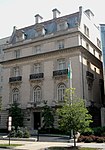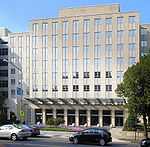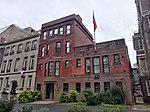Peterson Institute for International Economics
The Peterson Institute for International Economics (PIIE), previously known as the Institute for International Economics (IIE), is an American think tank based in Washington, D.C. It was founded by C. Fred Bergsten in 1981 and is currently led by Adam S. Posen. The institute conducts research, provides policy recommendations, and publishes books and articles on a wide range of topics related to the US economy and international economics. According to the 2015 Global Go To Think Tank Index Report (Think Tanks and Civil Societies Program, University of Pennsylvania), PIIE was number 20 (of 150) in the "Top Think Tanks Worldwide" and number 13 (of 60) in the "Top Think Tanks in the United States".
Excerpt from the Wikipedia article Peterson Institute for International Economics (License: CC BY-SA 3.0, Authors).Peterson Institute for International Economics
Massachusetts Avenue Northwest, Washington Dupont Circle
Geographical coordinates (GPS) Address Nearby Places Show on map
Geographical coordinates (GPS)
| Latitude | Longitude |
|---|---|
| N 38.9083 ° | E -77.0409 ° |
Address
Massachusetts Avenue Northwest 1750
20036 Washington, Dupont Circle
District of Columbia, United States
Open on Google Maps








